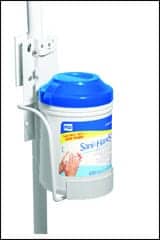AspenBio Pharma Inc has filed a Premarket Notification [510(k)] with the U.S. Food and Drug Administration ("FDA") for its AppyScore™ Test, the first blood-based test designed as an aid in the diagnosis of human appendicitis.
"This FDA 510(k) submission represents a major milestone in advancing our AppyScore appendicitis test platform toward commercialization," said Daryl Faulkner, chief executive officer of AspenBio. "The experienced group that has prepared this submission including experts inside and outside of the company has produced a complete, highly professional and quality submission package."
The 510(k) filing as submitted describes the following indication of use:
"The AppyScore™ Test is an ELISA test system that is used to quantitatively measure S100A8/A9 heterodimer complex in blood. It is an in vitro diagnostic device that is intended to be used as an adjunctive tool for the diagnosis of acute appendicitis in conjunction with additional diagnostic modalities (such as clinical exam, basic laboratory testing, imaging) in patients with abdominal pain that is suspicious for acute appendicitis."
AppyScore is a new in vitro diagnostic test designed to help health care professionals accurately diagnose acute appendicitis when used in combination with standard diagnostic modalities and a clinical examination. For this urgent and oftentimes difficult to diagnose and potentially life threatening disease, clinical trial results indicate AppyScore has sufficient sensitivity and specificity to be a useful adjunctive diagnostic tool in an emergency department setting.
Summarized below are the data included in the 510(k) submission at the original test threshold ("cut-off") of AppyScore at 20 units. The study design allowed for supplemental analysis of alternative cut-off values for optimizing the utility of the device and the table also includes data at the cut-off of 14 units from that supplemental analysis.
510(k) Submission Data
———————-
Cut-off = 14 Cut-off = 20
———— ————
AppyScore Value (95% CI)
Sensitivity 90% (85-93) 77% (71-82)
Specificity 33% (28-37) 48% (44-53)
Negative Predictive Value 87% (81-91) 81% (76-86)
A value of 14 units provides a meaningful improvement in sensitivity which is optimal for a test that is designed to help aid in the evaluation of patients presenting with symptoms suggestive of a potentially serious health outcome.
This filing advances the company’s commercialization plan for AppyScore, which involves initially filing the 510(k) based on the ELISA test format. Upon receiving market clearance for this device, the company plans to use the ELISA device as a predicate for a rapid assay device that includes a reader instrument. The company has been advancing the development and testing of this rapid assay and reader instrument, which has progressed to late prototype stage.
This rapid assay system represents the format the company plans to ultimately commercialize, since it offers many features and benefits over an ELISA-based test. It can produce results in approximately 15 minutes, which in turn can be rapidly and accurately uploaded to a hospital’s Laboratory Information System (LIS) via a built-in electronic interface. More importantly, as a fully integrated, stand alone assay system, it can significantly reduce operator dependence and corresponding potential for errors.
AspenBio plans to begin initial hospital testing of the rapid assay device in late 2009. Assuming the company receives FDA clearance of the AppyScore ELISA test and development work is completed, clinical trials of the rapid assay are planned to begin in early 2010. These follow-on trials will be designed to support a 510(k) submission for this rapid assay platform using the ELISA test as a predicate, as well as to provide physicians with additional information on the product’s utility.
Source: AspenBio Pharma


